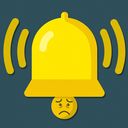Patients are drowning in appointment reminders

Got an upcoming doctor's appointment? Perhaps a prescription to refill or a dental cleaning? Odds are your phone has been pinging away with incessant reminders about it.
Why it matters: It's not just you. There's a growing flood of emails, texts, phone calls and other prods to patients that — beyond just potentially becoming another digital annoyance — may make them tune out the important stuff.
What they're saying: "There's definitely a lot of information overload going on," said Jon Freedman, a digital strategist with health care consulting firm Chartis.
- To be fair, he said, data shows the reminders get patients to show up — at least initially.
- The problem is, he said: "That data also will also show that if you overload patients with messages, it'll just get lost. But that first data point, everybody sees it, so everybody's doing it."
The big picture: Challenging economics for doctors, pharmacies and other providers coming out of the pandemic, as well as the proliferation of tech tools, are largely driving this surge in digital noise, experts say.
- "Doctors are like the airline industry in the '90s because they have perishable inventory," Oliver Kharraz, CEO of booking site Zocdoc, told Axios. "It's very expensive for either one of them not to have that seat filled."
- The airlines figured out how to pack their planes, but in doctor's offices, about 20% to 30% of appointment slots go unused because of last-minute cancellations and no-shows, he said.
It's natural to wonder if another pandemic legacy — people feeling more comfortable ducking out on plans — is driving some of this.
- But data doesn't indicate patients have gotten flakier, Kharraz said. Instead, there's a key difference: The length of time they have to wait for appointments has gotten far longer.
- "For every 24 hours that you add between the time of scheduling the appointment and the appointment happening, you add roughly a 4% increase in the likely no-show or cancellation rate of that patient," Kharraz said.
Between the lines: Health systems invested a lot in tech tools during the pandemic to make it easier to see patients virtually.
- These tools — which may each come with their own reminder features — often don't talk to each other.
- Add that to communications patients are already getting from specialists, insurers, pharmacies and marketing departments, and it becomes a "sort of potpourri of messages," said Adrienne Boissy, chief medical officer for Qualtrics, a company focused on measuring patient experience.
- "The best part is, your clinician has no idea," she said.
Zoom in: Boissy noted that her 9-year-old son even got a reminder in his patient portal about getting to an appointment on time.
- "Well, this explains everything about why this is an ineffective strategy, right?" she said.
- It's an example of how health care still has a limited understanding of its "customers'" communication preferences, Boissy said.
- "I'm saying 'customer' here very intentionally because every other industry knows their customer better than we know many of our patients in health care," she said.
- Patients should have greater power over where and how they're getting reminders, she said: "You've got to control the chaos."
What we're watching: Artificial intelligence tools may also play a role in better targeting communications to patients, if they can sort out which patients do and don't need a bit of prodding.
- "There should be a difference in the reminder strategy for someone who shows up for their appointment every single time ... versus someone who hasn't responded," Boissy said. "Those are very different people you are trying to reach and engage. And yet often the strategy is the same."
Our thought bubble: Digital reminders are likely to increase with the growing number of health care players who have a financial stake in keeping patients healthy, rather than just treating them when they're sick.
- They'll really want to make sure you make it to a visit for that flu shot or to pick up a prescription — and they probably won't hesitate to ping you about it.